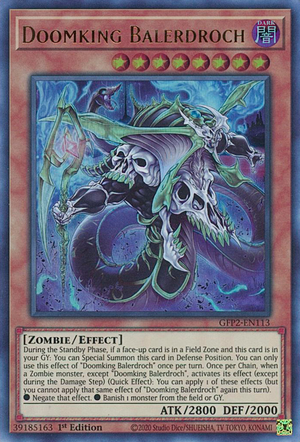Difference between revisions of "Zombie"
(→Icons: The DDM Type is Invincible, not Zombie) |
(→TCG/OCG: More correct this way) (Tags: Mobile edit, Mobile web edit) |
||
| (2 intermediate revisions by 2 users not shown) | |||
| Line 26: | Line 26: | ||
* [[Shiranui]] | * [[Shiranui]] | ||
* [[Underworld]] | * [[Underworld]] | ||
| + | * [[Vampire]] (excluding "[[Vampire Hunter]]") | ||
* [[Vendread]] | * [[Vendread]] | ||
* [[Wight]] | * [[Wight]] | ||
| + | * [[Yo-kai Girl]] (excluding "[[Ghost Ogre & Snow Rabbit]]") | ||
* [[Zombie counterpart]] | * [[Zombie counterpart]] | ||
;Mixed | ;Mixed | ||
* [[Ghostrick]] | * [[Ghostrick]] | ||
| − | + | ||
| − | |||
| − | |||
===''[[Rush Duel]]''=== | ===''[[Rush Duel]]''=== | ||
* [[Ghost Story]] | * [[Ghost Story]] | ||
| Line 105: | Line 105: | ||
==Trivia== | ==Trivia== | ||
* The Japanese name of the Type is misspelled (it actually approximates to "Undeat"), as "Undead" is normally transcribed as ''Anded'''do''''' 「アンデッド」. ''Andeddo'' has been inconsistently used in early ''Yu-Gi-Oh!'' media, but was later standardized to ''Andetto'' for unclear reasons (possibly for the sake of consistency). | * The Japanese name of the Type is misspelled (it actually approximates to "Undeat"), as "Undead" is normally transcribed as ''Anded'''do''''' 「アンデッド」. ''Andeddo'' has been inconsistently used in early ''Yu-Gi-Oh!'' media, but was later standardized to ''Andetto'' for unclear reasons (possibly for the sake of consistency). | ||
| − | |||
== In other languages == | == In other languages == | ||
| Line 119: | Line 118: | ||
| ko_name = 언데드 | | ko_name = 언데드 | ||
| ko_rr = Eondedeu | | ko_rr = Eondedeu | ||
| + | | ko_trans = Undead | ||
| zh_name = 不死 | | zh_name = 不死 | ||
| zh_pinyin = Bùsǐ | | zh_pinyin = Bùsǐ | ||
| + | | zh_trans = Undead | ||
}} | }} | ||
Latest revision as of 14:30, 28 May 2024

Zombie (Japanese: アンデット Andetto, lit. "Undead") is a Type of Monster Cards.
Contents
OverviewEdit
Zombies represent undead beings, including mummies, skeletons, vampires, yokai, biologically-infected humans and animals, ghosts, and of course, zombies.
Gameplay-wise, Zombies are heavily associated with the Graveyard; many Zombie effects and Zombie support involve sending Zombies from the Deck to the GY, summoning Zombies from the GY, or banishing Zombies from the GY for other effects. Many Zombie monsters have effects that implicitly relate them to "Zombie World", usually involving affecting the opponent's Zombie monsters on their field or in their GY, which "Zombie World" can set up; summoning monsters from the opponent's GY is also a somewhat common pattern among Zombie effects.
Zombies are mostly either EARTH or DARK-Attribute, and usually have low DEF. The type also has a focus on Synchro Summoning, with many its key playmakers and boss monsters being Tuners and Synchro monsters, respectively.
In the Yu-Gi-Oh! The Falsebound Kingdom, Zombies are treated as Fiend monsters.
Of particular note, the Yokai Type from the Yu-Gi-Oh! GX manga are all turned into Zombies when they were released in the OCG/TCG proper.
ThemesEdit
TCG/OCGEdit
Rush DuelEditAnime/manga-onlyEdit
|
Appearance in mediaEdit
IconsEdit
These are icons used to represent the Zombie Type in various video games. They all depict a skull or skeleton, often with one eye socket glowing red.
TriviaEdit
- The Japanese name of the Type is misspelled (it actually approximates to "Undeat"), as "Undead" is normally transcribed as Andeddo 「アンデッド」. Andeddo has been inconsistently used in early Yu-Gi-Oh! media, but was later standardized to Andetto for unclear reasons (possibly for the sake of consistency).
In other languagesEdit
| Language | Name | Romanized | Translated |
|---|---|---|---|
| French | Zombie | ||
| German | Zombie | ||
| Italian | Zombie | ||
| Portuguese | Zumbi | ||
| Spanish | Zombi | ||
| Japanese | アンデット | Andetto | Undead |
| Korean | 언데드 | Eondedeu | Undead |
| Chinese (Traditional and Simplified) | 不死 | Bùsǐ | Undead |